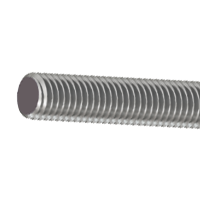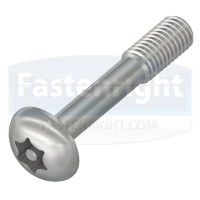Less Common Thread Types for Fasteners
When it comes to fasteners, we often think of standard threads like metric UNC, UNF, BA and BSF threads. However, there are lesser-known thread types that serve specific purposes in various industries. BSW threads (British Standard Whitworth), Acme threads, and Trapezoidal threads are three such examples, each with unique characteristics and applications.
At Fastenright Ltd., we offer a wide selection of thread types for all kinds of fasteners. Our experts have years of experience in selecting and supplying the most appropriate fastener whatever your application. Read on to find out more about these less common thread types or give us a call to discuss your specific requirements.
British Standard Whitworth (BSW) Threads
BSW threads were the first standard screw thread type to be adopted universally. Developed by Joseph Whitworth in the 19th century, BSW threads feature a 55-degree thread angle and a rounded crest and roots. These threads were commonly used in the UK and its former colonies but have been largely replaced by metric threads in modern applications.
Applications: BSW threads are still found in some vintage machinery, automotive parts, and where compatibility with older equipment is required.
Acme Threads
Acme threads are trapezoidal-shaped screw threads with a 29-degree thread angle. They have a flat crest and a flat or slightly rounded root, making them suitable for applications requiring high load-bearing capacity and ease of engagement. Acme threads are known for their strength and resistance to wear.
Applications: Acme threads are commonly used in lead screws for machine tools, jackscrews, and in applications where precise linear motion is required, such as in CNC machines and linear actuators.
Trapezoidal Threads
Trapezoidal threads resemble Acme threads but differ in their thread angle, which is 30 degrees. They also have a flat crest and a flat or slightly rounded root. Trapezoidal threads are designed to provide strong, reliable performance under heavy loads and are suitable for transmitting motion and power efficiently.
Applications: Trapezoidal threads are used in machinery, automotive components (such as steering mechanisms), and in applications where smooth and reliable motion transfer is critical.

Trapezoidal Threaded Rods and Nuts
Why Consider These Threads?
While metric and imperial threads dominate many applications, BSW, Acme, and Trapezoidal threads offer distinct advantages in specific scenarios:
- Strength and Durability: These threads are often preferred in applications requiring high load-bearing capabilities and resistance to wear.
- Precision and Reliability: They excel in applications where precise linear motion or power transmission is essential.
- Compatibility: In industries with legacy equipment, these threads ensure compatibility with older systems and components.
While less common than metric or imperial threads, BSW, Acme, and Trapezoidal threads play crucial roles in various industries where their specific characteristics are valued. Understanding their applications and advantages can help engineers and manufacturers choose the right thread type for specific project. Whether it’s preserving historical equipment compatibility or enhancing modern machinery’s functionality, these threads continue to prove their worth in the diverse world of fasteners and mechanical engineering.
Do You Need Fasteners with Specific Thread Types?
At Fastenright Ltd., we can supply fasteners with any of these thread types, customised to meet your specific requirements. Give us a call and speak to an expert, our team is ready to assist with high-quality products tailored to your needs.




